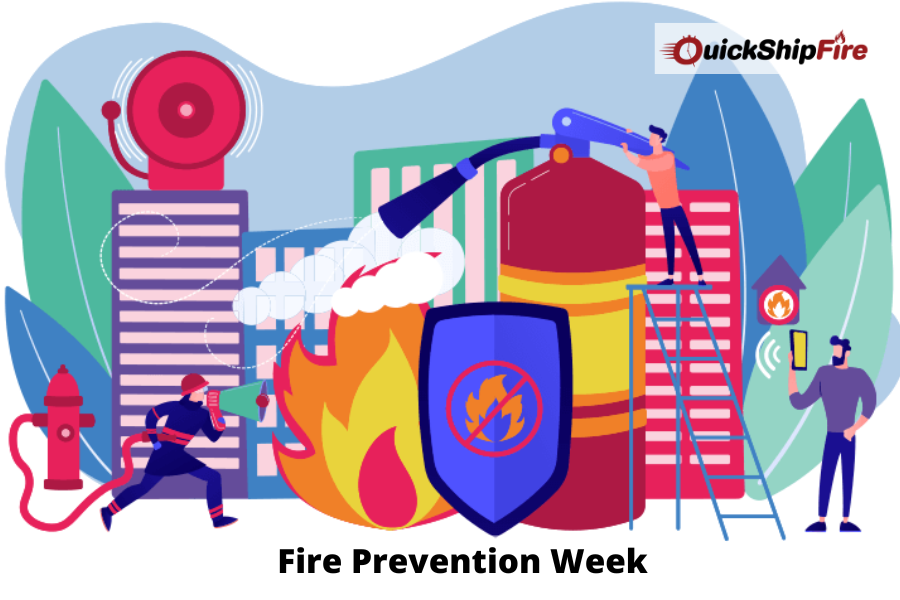Fire Prevention Week was started by the National Fire Protection Association (NFPA) in 1922 to commemorate the Great Chicago Fire of 1871. The purpose of Fire Prevention Week is to teach children and adults how to stay safe during a fire.
In the United States, we celebrate Fire Prevention Week and Month by educating families, students, and communities about fire safety. In this month, fire departments educate the communities and encourage parents and loved ones to practice fire prevention and whole home safety.
- The #1 cause of accidental poisoning in the US is carbon monoxide (CO)
- The cause of 3 of every 5 home fire deaths was nonworking smoke alarms.
- Home fires are caused primarily by unattended cooking
- Approximately half of homeowners do not have an escape plan.
- 60% of consumers fail to test their smoke and CO alarms on a monthly basis
- Only 47% of people report having a CO alarm in their home
Fire Prevention Week is annually centered on a different theme in order to focus fire prevention education on a current fire related issue. It is the ideal time to teach and discuss fire safety with your entire family — including how to test fire alarms, how to change fire alarm batteries or upgrade to a 10-year sealed battery alarm, and plan an escape route.
History of Fire Prevention Week
The NFPA has sponsored Fire Prevention Week since 1922. The first Fire Prevention Week was observed in 1925 by President Calvin Coolidge, making it one of our country’s longest-running public health events. Teachers, adults, and children learn how to stay safe in case of a fire during Fire Prevention Week. As a part of the mission to reduce fire casualties, firefighters provide lifesaving public education.
Every year, Fire Prevention Week is observed during the week of October 9th in commemoration of the Great Chicago Fire, which began on October 8, 1871, and caused devastating damage. During this horrific conflagration, more than 250 people lost their lives, 100,000 were displaced, 17,400 structures were destroyed, and more than 2,000 acres were burned.
About Fire Prevention Week 2022
NFPA has announced “Fire Won’t Wait, Plan Your Escape” as the theme for Fire Prevention Week 2022, October 9-15, reinforcing the critical importance of developing and practicing a safe escape plan in an event of fire with all members of the household and practicing it regularly. This October also marks the 100th anniversary of Fire Prevention Week, the nation’s longest-running public health event.
Key messages about fire prevention week theme “Fire Won’t Wait. Plan Your Escape”
- Your home escape plan should address the needs of all family members, including those who are physically or sensory impaired.
- Smoke alarms should be installed in every sleeping room, outside each sleeping area, and on every level in the home.
- Each smoke alarm should be connected to the others so that when one sounds, they all sound.
- Identify a safe meeting place a safe distance outside your home where everyone should gather.
- Make sure you practice your home fire drill at least twice a year with everyone in your household, including guests.
Home Fire Escape Planning and Practice
Everyone should plan and practice a home fire escape. It is important for everyone to be prepared in advance, so they can react quickly when the smoke alarm sounds. Every home is different, so every home fire escape plan will be different as well.
Smoke alarms
- Smoke alarms detect smoke well before you do, alerting you to danger. You should install smoke alarms in every part of your home. Do not put it in your kitchen or bathrooms.
- Make sure your alarm is listed with a testing laboratory, which means it has met certain safety standards.
- Use interconnected smoke and carbon monoxide alarms throughout the house for the best protection. These can be installed by a qualified electrician. As a result, you can hear the alarm no matter where it originates in your house.
Home Fire Alarm Equipments by Quickshipfire
A fire can double in size in less than 30 seconds, making it crucial to do all you can to prevent one from happening. If you are missing or have broken or damaged fire safety equipment, call us at (833)747-7845 to order replacement fire alarm parts. Quickshipfire is a leading fire alarm equipment supplier in USA.
To ensure you’re protecting your home and the people inside, talk to Quickshipfire team about your fire alarm parts today!

